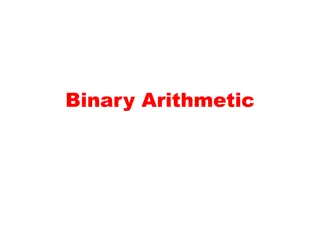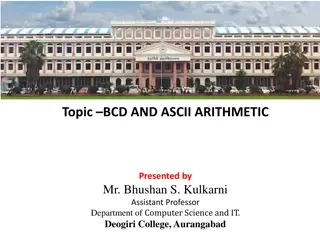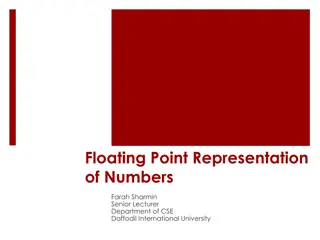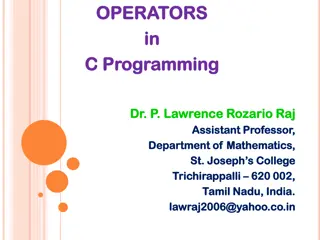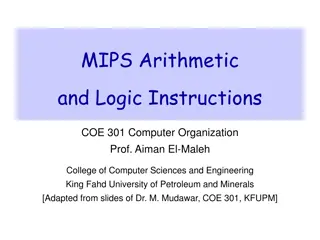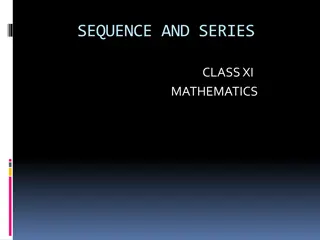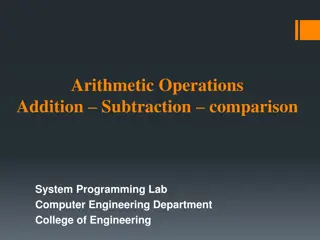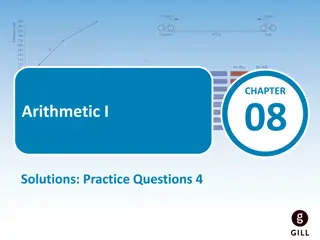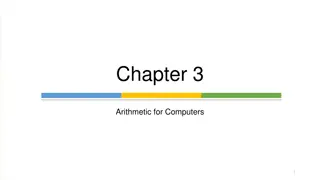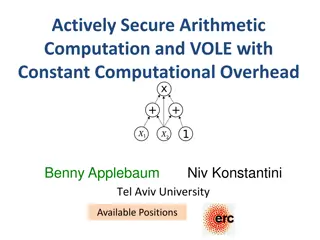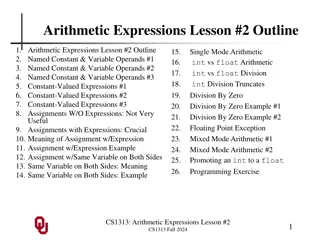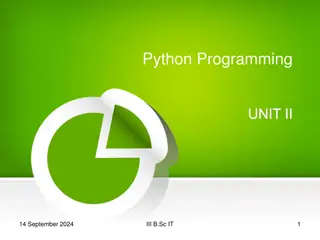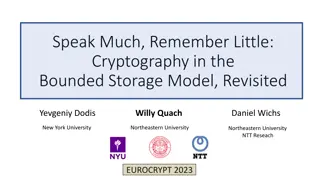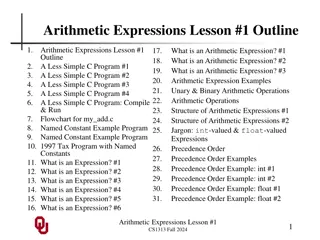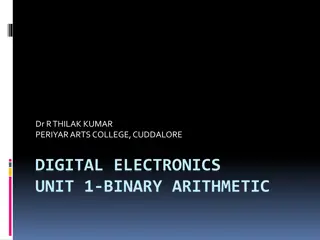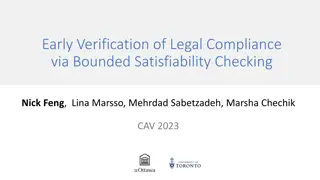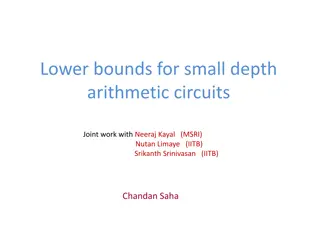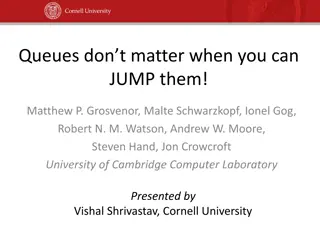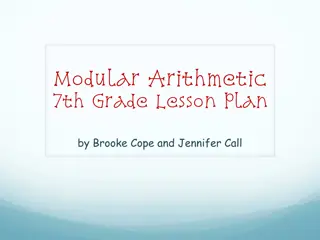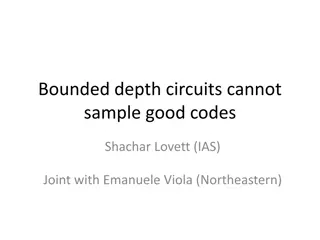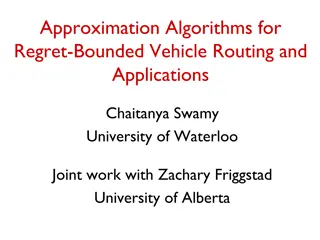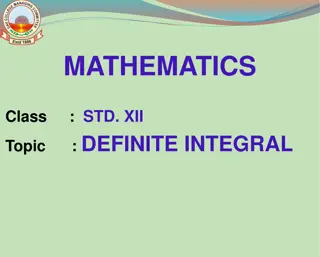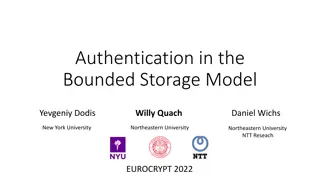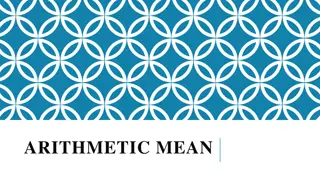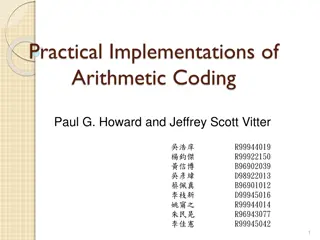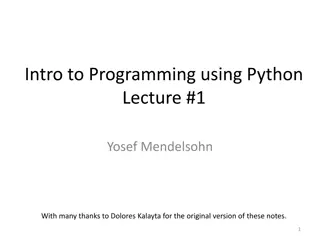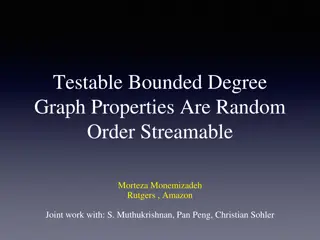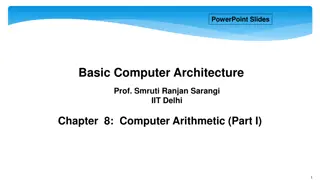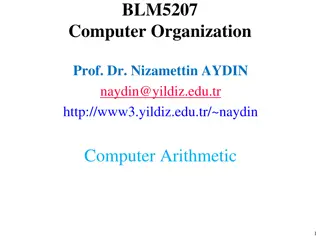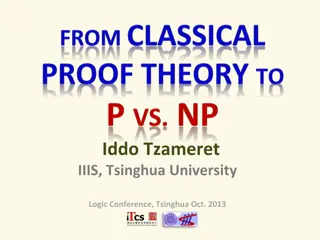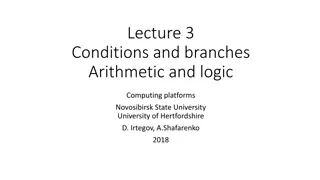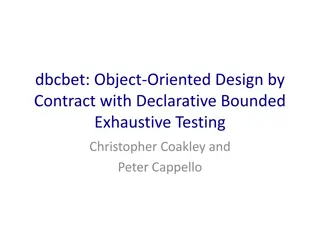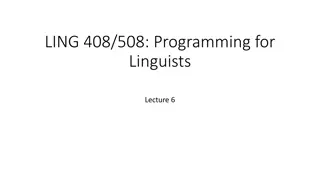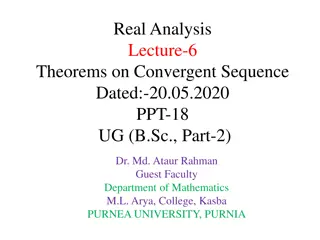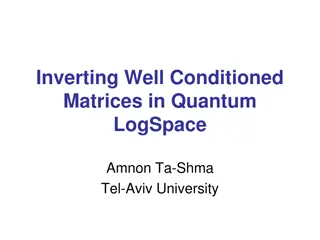Infinite Impulse Response Filters
This lecture discusses the design and implementation of Infinite Impulse Response (IIR) filters using biquad structures. It covers topics such as stability, bounded-input bounded-output equalization, filter design, and filter implementation. The lecture also includes demos on filter design and concl
11 views • 29 slides
Cognitive Load Classification with 2D-CNN Model in Mental Arithmetic Task
Cognitive load is crucial in assessing mental effort in tasks. This paper discusses using EEG signals and a 2D-CNN model to classify cognitive load during mental arithmetic tasks, aiming to optimize performance. EEG signals help evaluate mental workload, although they can be sensitive to noise. The
0 views • 19 slides
Understanding Modular Arithmetic and Rings in Mathematics
Exploring the concepts of modular arithmetic and rings in mathematics, including properties, operations, and examples. Learn how modular arithmetic simplifies computations and how rings define closed mathematical systems with specific laws and identities.
6 views • 14 slides
Binary Arithmetic
Explore the world of binary arithmetic, including addition, subtraction, multiplication, and division. Learn the rules and examples of performing basic binary operations efficiently. Understand how to convert binary numbers to decimal equivalents. Enhance your understanding with visual explanations
0 views • 51 slides
Understanding BCD and ASCII Arithmetic in 8086 Assembly Language
BCD (Binary-Coded Decimal) and ASCII (American Standard Code for Information Interchange) are key concepts in 8086 assembly language for numerical and character manipulations. BCD Arithmetic involves addition and subtraction techniques using instructions like DAA and DAS. The adjustment instructions
1 views • 21 slides
Understanding Floating Point Representation of Numbers
Floating point representation is crucial in computer arithmetic operations. It involves expressing real numbers as a mantissa and an exponent to preserve significant digits and increase the range of values stored. This normalized floating point mode allows for efficient storage and manipulation of r
0 views • 12 slides
Understanding Arithmetic Operators in C Programming
C programming language provides various arithmetic operators such as addition, subtraction, multiplication, division, and modulo division. Integer division truncates any fractional part, while modulo division produces the remainder of an integer division. When operands in an arithmetic expression ar
1 views • 18 slides
Overview of MIPS Arithmetic and Logic Instructions in COE 301
MIPS Architecture consists of R-Type and I-Type instruction formats for arithmetic, logical, shift, and immediate constant operations. It includes a variety of general-purpose registers and specific units for execution, floating-point operations, and memory handling. The presentation outlines the st
2 views • 29 slides
Understanding Sequences and Series in Mathematics
Sequences and series are fundamental concepts in mathematics, with sequences consisting of terms denoted as a1, a2, a3, ... and series involving the sum of terms in arithmetic and geometric progressions. Learn about arithmetic progression, geometric progression, terms, and formulas for finding sums
1 views • 11 slides
Overview of 8086 Assembly Language Arithmetic Operations
The 8086 assembly language provides instructions for arithmetic operations such as addition, subtraction, and comparison. These operations are essential for manipulating data in memory and registers. The instructions support various operand types, including registers, memory locations, and immediate
0 views • 24 slides
Arithmetic Practice Questions and Currency Conversions
Practice questions involving currency conversions and arithmetic calculations are provided in the content. Various scenarios are presented, such as determining costs in different currencies, finding exchange rates, and comparing prices in different countries based on exchange rates. The questions re
1 views • 25 slides
Understanding Arithmetic Operations for Computers
The chapter delves into the fundamentals of arithmetic for computers, covering operations on integers, dealing with overflow, handling floating-point real numbers, and more. It explores addition, subtraction, multiplication, and division in detail, showcasing examples and techniques for efficient co
4 views • 18 slides
Actively Secure Arithmetic Computation and VOLE Study
Exploring actively secure arithmetic computation and VOLE with constant computational overhead at Tel Aviv University. Understanding how functions are represented in secure computation using arithmetic circuits over boolean circuits. Efficiently evaluating arithmetic circuits over large finite field
0 views • 36 slides
Understanding Arithmetic Expressions and Constants in Programming
Learn about the importance of named constants and variables in arithmetic expressions, how to perform assignments with and without expressions, and the implications of working with integer and floating-point arithmetic in programming. Explore examples and exercises to enhance your programming skills
0 views • 26 slides
Python Programming Expressions and Arithmetic Operators Overview
Learn about expressions, arithmetic operators, value combinations with operators, operator precedence and associativity in Python programming. Understand arithmetic operations, variable assignments, common errors, and examples highlighting key concepts such as unary and binary operators. Enhance you
0 views • 15 slides
Cryptography in the Bounded Storage Model: Revisited - Eurocrypt 2023
Cryptography researchers revisit the Bounded Storage Model (BSM) to enhance security in transmitting messages while considering limited storage capacities. The BSM restricts adversaries to limited storage, enabling unconditional security. The model aims to address challenges in message transmission
0 views • 16 slides
Understanding Arithmetic Expressions in C Programming
This lesson outlines the basics of arithmetic expressions in C programming, focusing on how to perform unary and binary arithmetic operations. It covers the structure of arithmetic expressions, precedence order, and examples to illustrate these concepts. The provided C program, 'my_add,' demonstrate
0 views • 31 slides
Introduction to Binary Arithmetic for Digital Electronics
Binary arithmetic is fundamental in digital electronics, involving addition, subtraction, and multiplication of binary numbers. This guide explains the rules and examples of binary arithmetic operations, such as binary addition and subtraction, along with detailed steps and illustrations for better
0 views • 21 slides
Bounded Satisfiability Checking for Early Legal Compliance Verification
Early verification of legal compliance is crucial to avoid consequences such as violating regulations like GDPR. Through bounded satisfiability checking using Metric First-order Temporal Logic (MFOTL), this research focuses on system design verification for regulatory compliance. The study addresses
0 views • 29 slides
Lower Bounds for Small Depth Arithmetic Circuits
This work explores lower bounds for small-depth arithmetic circuits, jointly conducted by researchers from MSRI, IITB, and experts in the field. They investigate the complexity of multivariate polynomials in arithmetic circuits, discussing circuit depth, size, and the quest for an explicit family of
0 views • 114 slides
Achieving Bounded Latency in Data Centers: A Comprehensive Study
Data centers face challenges in providing consistent low latencies due to in-network interference and varying workloads. This study explores solutions to guarantee strong latency performance, mitigate latency variance, and minimize performance degradation for latency-sensitive applications. By analy
0 views • 18 slides
Exploring Modular Arithmetic and Time Concepts in 7th Grade Math
Delve into the world of modular arithmetic and time calculations with this 7th-grade lesson plan. Students will learn how to determine future times based on modular arithmetic principles, model different time scenarios, and understand concepts like congruence in time calculations. Through engaging a
0 views • 20 slides
Lower Bounds on Sampling Good Codes in Bounded-Depth Circuits
Bounded-depth circuits are proven unable to sample or approximate good codes effectively. This work delves into lower bounds, showcasing that bounded families of circuits face limitations in computing specific functions or sampling distributions. The example of Parity in AC0 circuits illustrates the
0 views • 21 slides
Regret-Bounded Vehicle Routing Approximation Algorithms
Regret-bounded vehicle routing problems aim to minimize client delays by considering client-centric views and bounded client regret measures. This involves measuring waiting times relative to shortest-path distances from the starting depot. Additive and multiplicative regret measures are used to add
0 views • 28 slides
Understanding Definite Integrals in Mathematics
Explore the concept of definite integrals in mathematics, covering properties, solving methods, and applications in finding areas bounded by curves. Prior knowledge of functions, limits, derivatives, and indefinite integrals is essential to grasp this topic effectively. Dive into the unique value of
0 views • 32 slides
Cryptography in Bounded Storage Model: Ensuring Secure Communication
Cryptography in the Bounded Storage Model provides insights into securing communication with secrecy and authenticity. The model limits adversaries' memory without runtime restrictions, ensuring unconditional security for various primitives. Explore how this model safeguards messages from eavesdropp
0 views • 42 slides
Understanding Arithmetic Mean Calculation Methods
Arithmetic mean can be calculated in individual, discrete, and continuous series. In individual series, each item is listed separately, while in discrete and continuous series, items are grouped with frequencies. The mean can be computed using formulas tailored to each type of series, including meth
0 views • 4 slides
Approximation Algorithms for Regret-Bounded Vehicle Routing
This research explores regret-bounded vehicle routing problems (VRPs) where the focus is on minimizing client delays based on their distances from the starting depot. The study introduces a client-centric view to measure regret and devises algorithms for both additive and multiplicative regret-based
0 views • 23 slides
Practical Implementations of Arithmetic Coding
Explore the practical implementations, advantages, and disadvantages of arithmetic coding in this informative guide. Learn about the basic algorithm, dynamic interval expansion, integer arithmetic coding, and methods to improve the speed of arithmetic coding. Dive deep into encoding algorithms, exam
0 views • 78 slides
Introduction to Python Programming: Basics and Arithmetic Operations
Learn the fundamentals of Python programming with a focus on setting up the development environment, understanding the Python shell, working with arithmetic expressions, data types, and numerical operations. Explore operator precedence and solve simple arithmetic expressions to grasp the basics of P
0 views • 34 slides
Graph Property Testing and Algorithms Overview
Explore testable bounded degree graph properties, sparse graphs, d-bounded degree graphs, hyperfinite graphs, arboricity, maximum matching algorithms, and sublinear time approximation algorithms in graph data streams. Learn about various graph models and properties with examples, showcasing the impo
0 views • 53 slides
Understanding Computer Arithmetic Basics: Addition, Multiplication, Division, and More
Delve into the fundamentals of computer arithmetic with concepts such as adding 1-bit numbers, half adders, full adders, equations, circuits, and the addition of n-bit numbers. Explore the intricacies of binary arithmetic operations and learn how computers perform calculations effectively.
0 views • 84 slides
Understanding Computer Arithmetic: ALU, Integer Representation, and Twos Complement
Exploring the fundamental concepts of computer arithmetic including the Arithmetic & Logic Unit (ALU), integer representation methods, and the Twos Complement system. Learn about sign-magnitude, characteristics of Twos Complement representation, benefits, negation techniques, and special cases in co
1 views • 57 slides
Understanding Bounded Arithmetic and Definable Functions in Complexity Theory
Bounded arithmetic, as explored in complexity theory, focuses on theories like PA but with restrictions on formulas. The comprehension axiom determines sets that can exist, and TC is a first-order arithmetic theory defining functions within a specific complexity class. The witnessing theorem in TC e
0 views • 16 slides
Understanding Arithmetic and Logic Computing in CdM-8
Explore the fundamental concepts of arithmetic and logic computing, including conditions, branches, arithmetic instructions, logic instructions, shift and move instructions, and the practical applications of shift operations. Delve into CdM-8 flags semantics, C and unsigned subtraction/comparison, b
0 views • 14 slides
Understanding Arithmetic Operations for Computers
Explore fundamental arithmetic operations for computers, including addition, subtraction, multiplication, and division. Learn about dealing with overflow, real numbers in floating-point representation, and strategies for optimizing arithmetic efficiency. Discover why carry propagation can be slow an
0 views • 36 slides
Object-Oriented Design by Contract with Declarative Bounded Testing
Comprehensive overview of Object-Oriented Design by Contract (DbC) with Declarative Bounded Testing, exploring its background, principles, implementation in programming languages, and application through bounded exhaustive testing. Learn how DbC enhances software reliability and development practice
0 views • 31 slides
Introduction to Shell Arithmetic and Command.bc for Linguists
Today's lecture covers shell arithmetic, positional parameters for shell scripts, making shell scripts executable, and using command.bc for mathematical computations in the shell environment. Examples and demonstrations on shell arithmetic, utilizing the 'expr' command, and leveraging 'bc' command f
0 views • 21 slides
Theorems on Convergent Sequences with Proofs and Examples
The lecture covers theorems on convergent sequences, including the convergence of monotonic increasing and decreasing sequences when bounded. Detailed proofs for these theorems are provided, along with examples to determine if a sequence is bounded. The presentation includes step-by-step explanation
0 views • 6 slides
Quantum Space-Bounded Complexity in Logarithmic Space: A Comprehensive Overview
Quantum space-bounded complexity explores the memory requirements for solving problems in log space. Examples include matrix multiplication, undirected graph connectivity, and problems like inverting matrices and determining connectivity. The significance of deterministic log space (NL) and nondeter
0 views • 49 slides



